Asiwaju Bola Ahmed Tinubu on May 29, 2023 finally fulfilled his lifelong ambition to become President of the Federal Republic of Nigeria. While the journey to the highest office in the country wasn’t without its own fair share of challenges, which eventually proved surmountable, it is pertinent to note that the arduous task of getting the ‘crown’ took several years of preparation, one in which he invested, built political capital and formed alliances across the country.
But who really is the man, Bola Ahmed Tinubu beyond his political antecedents?
IVORY UKONU examines the various factors that have shaped President Bola Ahmed Tinubu:
Education

A few years after his birth on March 29 1952, Tinubu enrolled at St. John’s Primary School, Aroloya, Lagos and Children’s Home School in Ibadan, Oyo State for his primary and secondary education. In the mid-1970s he moved to the United States, working a variety of jobs to avoid being dependent on his family back home. He worked as a cab driver, a security man, a door guard, a dishwasher, and room service personnel, while he finished his college education. Transcripts show that he attended Southwest College (now Richard J. Daley College) in Chicago and then transferred to Chicago State University, where he earned a degree in 1979.
Career in Accounting
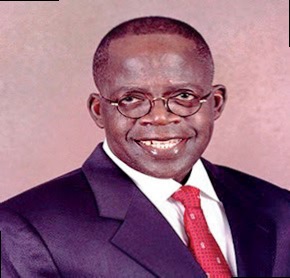 Accounting had been the focus of his studies while in the university. Upon graduation, he was eligible for several job offers from big accounting firms in the United States, such as Arthur Andersen, Arthur Young, Ernst and Whinney, Peat Marwick and Mitchell, Deloitte, IBM, Arthur Young, Deloitte, Haskins and Sells, etc. But taking the advice of his professor to choose a company where he would learn from and be relevant to his country, he chose to work with Deloitte and Touche because their clients were in the oil and gas sector and Nigeria was already an oil-producing country. It may not be out of place to imagine that perhaps, this was when the seed for national relevance was sowed in him.
Accounting had been the focus of his studies while in the university. Upon graduation, he was eligible for several job offers from big accounting firms in the United States, such as Arthur Andersen, Arthur Young, Ernst and Whinney, Peat Marwick and Mitchell, Deloitte, IBM, Arthur Young, Deloitte, Haskins and Sells, etc. But taking the advice of his professor to choose a company where he would learn from and be relevant to his country, he chose to work with Deloitte and Touche because their clients were in the oil and gas sector and Nigeria was already an oil-producing country. It may not be out of place to imagine that perhaps, this was when the seed for national relevance was sowed in him.
He would also work with General Telephone and Electronics (GTE) where he experienced first-hand racism and discrimination. He resigned his appointment and went on to work at Mobil, United Kingdom. In 1983, he returned to Nigeria and joined Mobil Nigeria where he started off as an auditor. In no time, he rose to the position of Treasurer. He was one of those who spearheaded the construction of the Mobile Nigeria House.
Stint in National Assembly
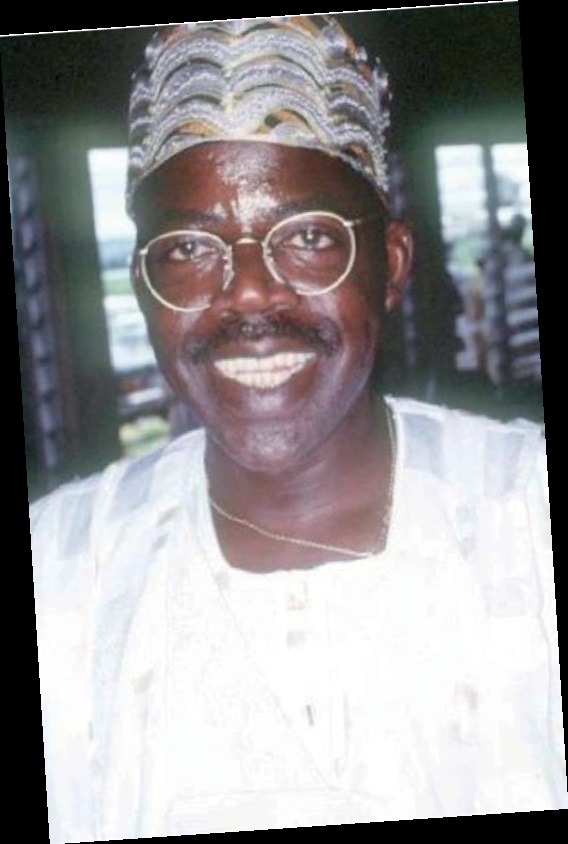
Tinubu ventured into politics in 1992 on the platform of the Social Democratic Party of Nigeria (SDP). He belonged to a faction of the party called the Peoples Front. The faction was led by late Shehu Musa Yar’Adua. Two prominent members of the group were former Kano State governor and former presidential candidate of the New Nigeria Peoples Party, NNPP, Rabiu Kwankwaso and former Vice President Atiku Abubakar, the presidential candidate of the Peoples Democratic Party, PDP.
The following year, Tinubu was elected to the National Assembly, to represent the Lagos West Senatorial District. As a senator, he was the chairman of the Appropriation, Finance, and Banking committee. He was also easily the most popular lawmaker in the Senate.
NADECO Days
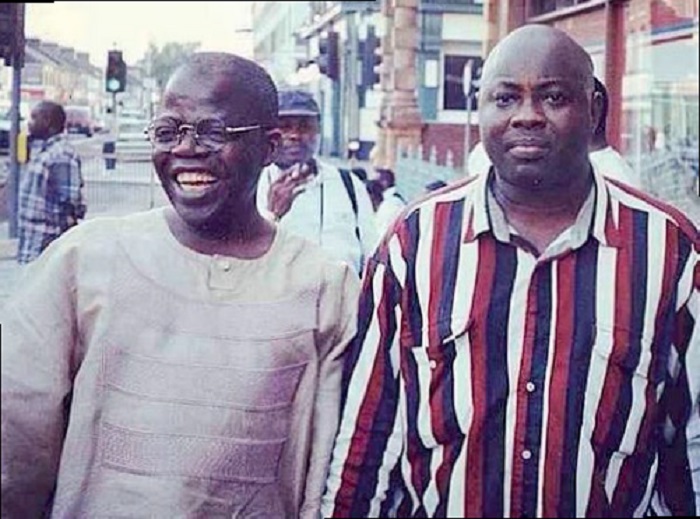
Following the annulment of the June 12, 1993 presidential election, Tinubu, alongside other pro-democratic politicians founded the National Democratic Coalition (NADECO), to restore democracy and to ensure that the June 12 election result was reinstated.
He spent his money to mobilise opposition groups at home and abroad. He was central to the success of NADECO. But the activities of the group were not pleasing to the late General Sani Abacha, the military Head of State at the time, who wanted to nip it in the bud by going after the arrowheads.
A trusted source who was Tinubu’s informant had asked him to prepare to leave the country as his safety could no longer be guaranteed. So first, he went into hiding. His hideout was somewhere off Awolowo Way, Ikoyi from where he had to go on a compulsory exile to Benin Republic and then to the United Kingdom in 1994. He was away for about six years.
On his return, following the death of Abacha in 1998, he hibernated in one of his Lagos houses situated somewhere in Alausa, where his late adopted mum, Alhaja Abibatu Mogaji used to live until her death.
Life as Political Godfather
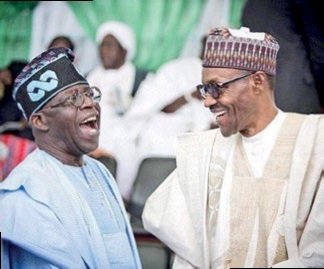
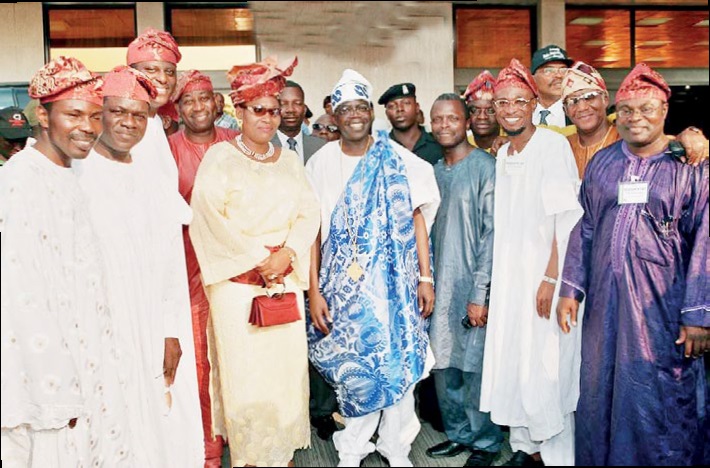
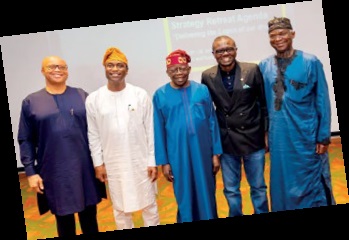
Following the end of his governorship tenure, Tinubu assumed the role of a godfather and king maker, using an extensive patronage of network to back candidates for various offices, particularly in the South-West. He is also known to have either helped to set up people in various business endeavours or invested in their business ideas to give them leverage.
He also spent years building his power base, from the private sector to the public sector, to the political arena, all through to market cooperatives, transport unions in Lagos – he built a nationwide network of contacts in preparation for such a time as this. Also, his tight grip over Lagos State ensured his staying power never waned.
Besides co-founding AD which later became Action Congress of Nigeria, ACN, the political party on which he emerged governor and financing it, he was instrumental in bringing together other parties and creating a mega opposition party with the merger of ACN, the Congress for Progressive Change (CPC), the All Nigeria Peoples Party (ANPP), a faction of the All Progressives Grand Alliance (APGA) and the new Peoples Democratic Party (nPDP), a faction of the then ruling PDP, into the All Progressives Congress (APC). This merger helped push ex-President Muhammadu Buhari to victory in 2015, ending 16 years in power for the opposition Peoples Democratic Party (PDP).
Life as Governor
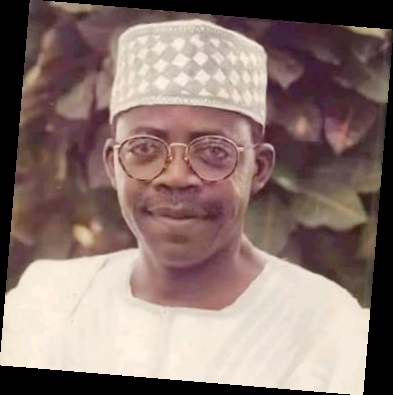
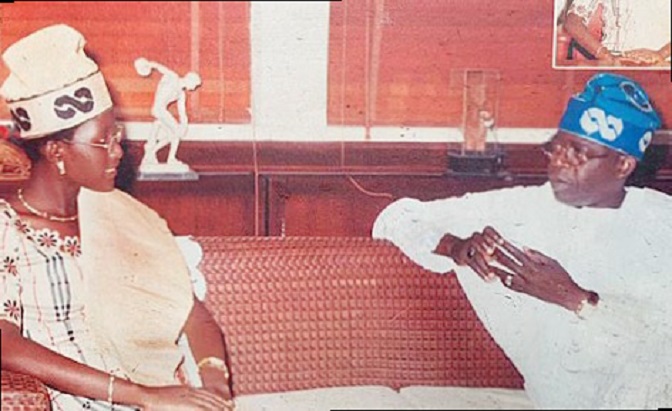
Shortly after the death of Abacha, Tinubu contested for the position of Executive Governor of Lagos State on the platform of the Alliance for Democracy (AD). He won the election and became the Governor of Lagos State in May 1999.
As governor, he didn’t exactly do much. For instance, a light rail project he started is yet to be completed after 20 years. It is however believed that under his guidance, his successors, all of whom he handpicked, elevated the status of the state in line with his own blueprint for how the state should be developed.
Tinubu’s tenure came to an end on May 29, 2007 when his chief of staff, Babatunde Raji Fashola succeeded him.
Business Interests
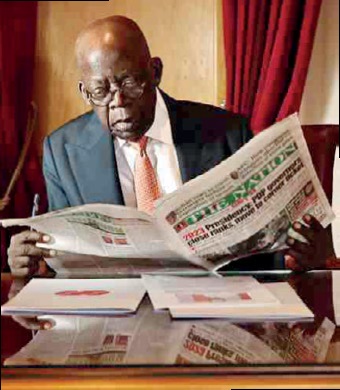
Although it is believed that he has his hands in several pies, only three major enterprises have been openly identified with him. On July 31, 2006, he founded ‘The Nation’ Newspaper, a daily newspaper published in Lagos State.
In 2010, he invested heavily into First Nation Airways, formerly Bellview Airline. It was headquartered in Lagos with the main promoter of the defunct Bellview Airline, Kayode Odukoya as its pioneer Managing Director.
In 2018, First Nation Airways was suspended for unauthorised and illegal operations, following the flagrant and continuous violation of the terms and conditions of the issuance of the Air Operators Certificate, AOC, by the Nigerian Civil Aviation Regulation, NCAA. The airline did not have at least two airworthy aircraft capable of servicing its approved schedule as required of it. In 2012, Tinubu floated Television Continental, TVC, a 24-hour news television based in Lagos.
Cat With Nine Lives
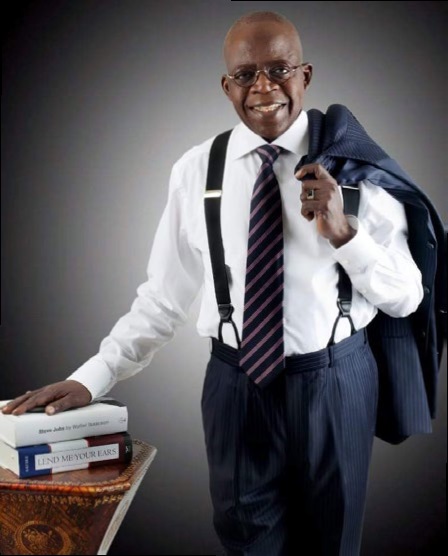
On December 13, 1999, as Lagos State governor, Bola Tinubu escaped an assassination attempt in which four other people were killed. The attackers shot at his convoy while he was on his way home from a tour of waste collection operations and security arrangements in the city. The then Commissioner of Police in the state, Mike Okiro, blamed the attack on the Oodua People’s Congress, OPC. The group was blamed for several outbreaks of ethnic violence in the state in which over 100 people died.
Tinubu later said that the attack reinforced his position that the state needed at least 20,000 additional policemen to safeguard the lives and properties of 8 million residents of Lagos at that time. Again, in March 2009, a plot allegedly hatched to assassinate him was identified and scuttled.
Notable chieftaincy titles
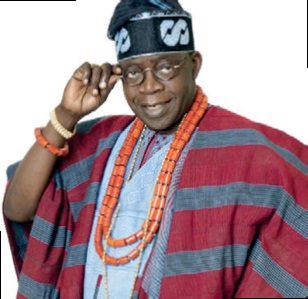
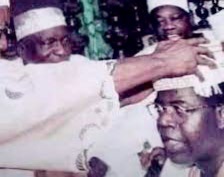
Although Tinubu holds several traditional chieftaincy titles, two of them however stand out. He is the Asiwaju of Lagos and also the Jagaban of Borgu Kingdom, Niger State. He was installed as ‘Asiwaju’ by the late Oba of Lagos, Oba Adeyinka Oyekan some years ago. It is one of the most revered chieftaincy titles in Yorubaland given to only individuals who have distinguished themselves in the community where they live. Asiwaju means ‘frontrunner’ in the development and progress of a community.
In 2006, the late Emir of Borgu, Alhaji Haliru Dantoro Kitoro III, honoured him with the title, ‘Jagaban’ of Borgu. The title is a Hausa word meaning ‘leader or front-runner’. Borgu Kingdom used to be under the Oyo Empire and the ‘Jagaban’ of Borgu was the right hand man of the Aare Ona Kakanfo (army chief of Yoruba land) during wars against enemies of Oyo empire. So the Emir gave him this title for his unconditional service and time-tested leadership roles.
Journey to Presidency
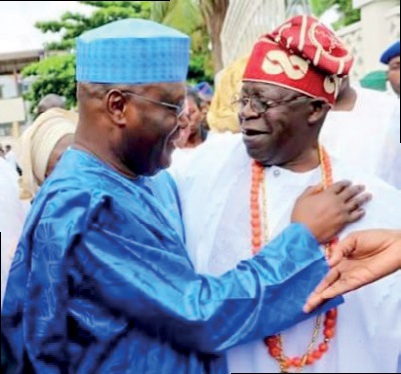

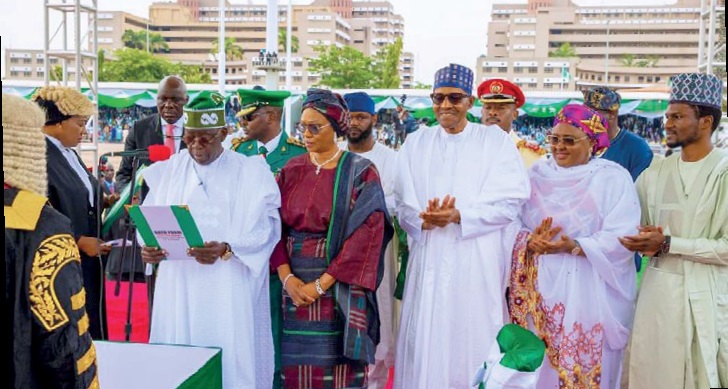
Tinubu’s first attempt to launch himself to the seat of power was in 2006 when he tried to persuade former Vice President Atiku Abubakar and two-time presidential candidate of the Peoples Democratic Party, PDP, to become the head of his political party, the Action Congress of Nigeria (ACN).
Abubakar, who was a member of the People’s Democratic Party (PDP), had fallen out with then President Olusegun Obasanjo over his ambition to succeed him as president. Tinubu offered him an opportunity to switch parties and join the ACN, offering him his party’s presidential candidacy, with the condition that he, Tinubu, would be Atiku’s running mate. Atiku declined the proposition. Despite switching to ACN, he chose someone other than Tinubu. The party failed woefully at the polls.
Tinubu’s second attempt was before the All Progressives Congress, APC primaries of 2015. Tinubu had hoped to be former President Muhammadu Buhari’s running mate after a successful merger of the ACN, Congress for Progressive Change, CPC (Buhari’s party) and several other splinter parties. Again, his ambition was dead on arrival as several people within the party opposed a Muslim/Muslim ticket, which they envisaged would make the party lose the presidential election.
In 2022, he not only emerged as a presidential aspirant on the platform of the All Progressives Congress, APC, but also flew the Muslim/Muslim kite and despite opposition from several quarters, contested the presidential election and was subsequently declared winner by the Independent National Electoral Commission, INEC.
Loving Husband
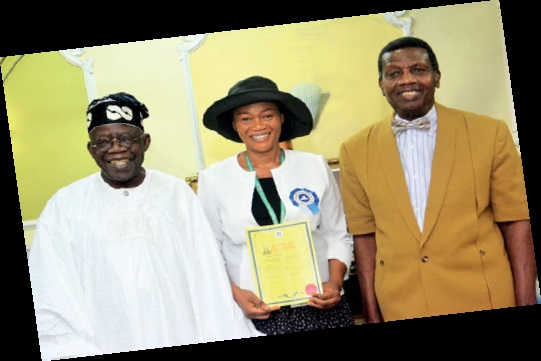
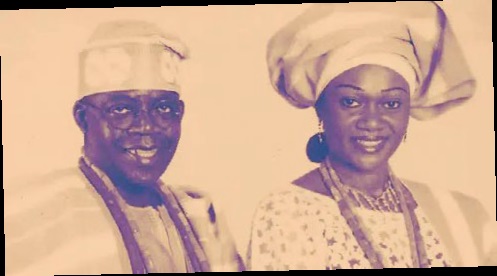
In 1987, Tinubu married Delta State-born Oluremi whom he met through her sister. Although he is a Muslim, Remi is a Christian and an ordained pastor with the Redeemed Christian Church of God, RCCG.
Remi’s dad reportedly warned Tinubu to ensure his daughter did not switch from her faith and he obeyed. Although their three children together bear Muslim names, they were raised in the Christian faith. They have been married for over three decades. Despite being controversial individuals, they have managed to keep their marriage scandal free. With Tinubu being the head of his close-knit dynasty, Remi, a former three-time senator, is well known to be the ‘neck that guides the ‘head’ in making very important and crucial decisions. A silent operator, she does this without blowing her trumpet.
However, since her husband’s emergence as the president-elect, the 63-year-old has not shied from asserting her authority. This was evident in the powerful speech she delivered at the Aso Villa Chapel where in apparent response to former Vice President Yemi Osinbajo’s admonition to the President to do what is right and shun corruption. Remi reiterated that God had indeed blessed her family and they therefore do not need the wealth of Nigeria to survive but to do the right thing.
Before Remi, Tibubu had fathered children with another woman, he never openly acknowledged. She died in 2018.
Loving Father And Grandfather
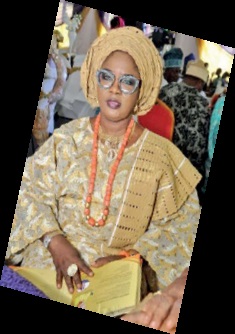
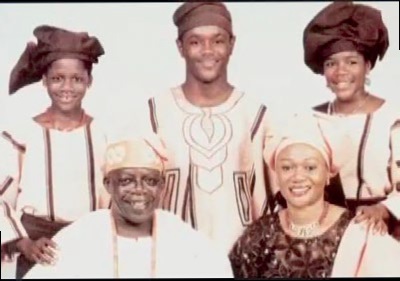
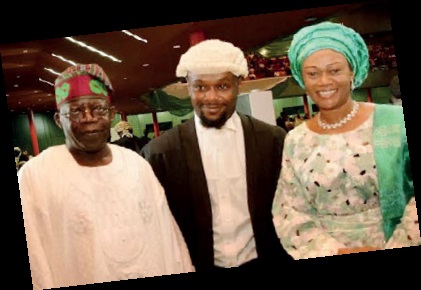
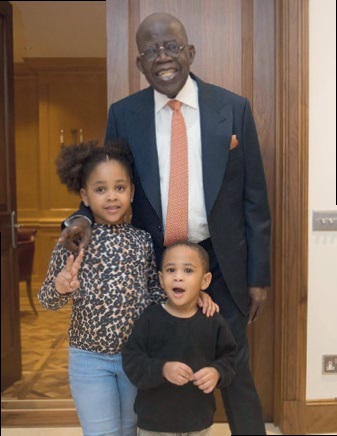
The President has six children. The older three, Jide (who is late), Folashade and Seyi, all have different mothers, while the last three daughters, Zainab, Abibat, Olayinka, belong to Remi.
Having had the best of education in America, Tinubu ensured he did the same for his children. Until his death in October 2017 from cardiac arrest at the age of 43, Jide lived in London with his wife and three children. He was a graduate of the University of Liverpool, England where he obtained a degree in Law.
Folashade, who used to be the Iyaloja-General of Lagos State which gave her authority over all traders in the state, is now the Iyaloja-General of Nigeria. This means she will now be in charge of all markets in Nigeria. She has a degree in Business Administration from the Middlesex University, London as well as a Master’s degree in the same course.
Following her father’s inauguration, the 47-year-old quickly unveiled a nongovernmental organisation called Friends of Iyaloja Initiative (FoI). According to her, she plans to use her little wealth of experience, connections and human resources available to her to support her dad’s administration. The NGO will also focus on youth and women empowerment.
Folashade used to be married, to Oyetunde Oladimeji Ojo, a former member of the House of Representative representing Ijero/Efon/Ekiti West, Ekiti State in the 7th National Assembly. They have allegedly parted ways.
The third child, Seyi, was born to Tinubu by a former air hostess turned prophetess, Bunmi Oshonaike, in 1985. He graduated with a Law degree from Lincoln University and a Master’s degree in Corporate and Commercial law from the University of Buckingham. Seyi runs Loatsad Promomedia Limited, an outdoor advertising company. He also runs a non-profit organisation, Noella Foundation, focused on job creation. He is married to a Nigerian/Lebanese called Layal and the marriage is blessed with two children. He also has a son with beauty entrepreneur, Freda Francis.
Then there is Zainab Abisola, Habibat, a graduate of Music from Berklee College of Music, Boston, USA and Olayinka.
Also, President Tinubu has eight grandchildren: Three from his late first son, Jide; three from his second son, Seyi and two from Folashade. He dotes on all his grandchildren.






